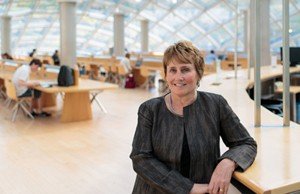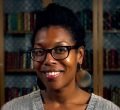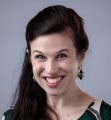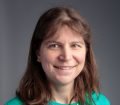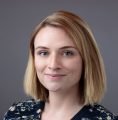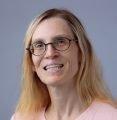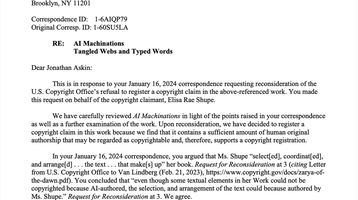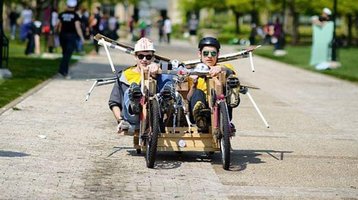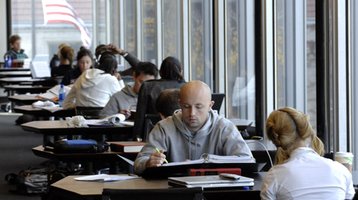Expanding services for faculty in a changing environment
Today’s scholarly environment presents an increasing array of challenges and opportunities for faculty and graduate students. New funding agency requirements call on researchers to present advance plans for openly sharing and preserving their data. Researchers are seeking ways to obtain data in new formats, to visualize information in new ways, and to rescue and share data for new purposes. Across disciplines, researchers are constantly challenged to find and adopt new tools and techniques. The Library is meeting this challenge by launching new initiatives, developing cutting-edge skills among our librarians, and bringing on new staff members who can assist researchers in this changing scholarly environment.
The Library’s new Center for Digital Scholarship (CDS) will be an umbrella for many of these services, facilitating the analysis of complex data, the visualization of theoretical relationships, the preservation of core research, and the sharing of research results. Stacie Williams, who joined the Library in August as the inaugural CDS Director, brings experience working with researchers in her previous position managing the Freedman Center for Digital Scholarship at Case Western Reserve University. Williams is working with subject librarians and faculty to identify priorities for establishing new spaces, technical infrastructure, and services that meet research and teaching needs. Following are some of the key areas in which initiatives are already underway.
Data preservation and sharing
The Library is expanding Knowledge@UChicago, the University’s digital institutional research repository, to better support the needs of data preservation. Led by new Scholarly Communications Librarian Nora Mattern, the Library is migrating Knowledge@UChicago to a new platform that was initially developed at CERN to support high energy physics. The new Knowledge@UChicago will launch in January and will provide funder-compliant solutions for researchers to share and preserve their code, data, and research results. Mattern also provides consultations on good data management practices, writing data management plans, and copyright.
The Library is also partnering with the Energy Policy Institute at Chicago (EPIC) to host a Council on Library and Information Resources Postdoctoral Fellow in Energy Economics Data Curation, Ana Trisovic. Trisovic is focusing on the particular challenges EPIC faculty face in collecting and preserving energy data, which is often available only from private industry or difficult-to-use government websites. She will be building a clearinghouse for EPIC’s data to facilitate discovery and reuse, as well as developing solutions for preserving and sharing the code that researchers use to analyze their data. Trisovic will use the skills she gained earning a PhD in Computer Science and her experience developing similar preservation solutions at CERN, applying them to the field of energy economics.
Data acquisition and use
The challenge of acquiring data for research is shared by many disciplines. For example, the Library subscribes to thousands of electronic books and journals, but researchers interested in data mining these texts cannot easily do so using the vendor’s PDFs, which are intended for individual reading. Kristin Martin, the Library’s Director of Technical Services, excels at working with publishers to provide alternative access that is optimized for data mining. The Library’s subject specialists can work with faculty across the disciplines and with Martin to seek such alternative access.
Elizabeth Foster, the Library’s new Social Sciences Data Librarian, can take this one step further, not only helping researchers find and acquire relevant data, but also helping them transform that data, for example, by formatting it to match the requirements of a particular tool. Foster will offer workshops and will be developing data analysis consultation services, with a focus on using R and Stata.
Geospatial analysis
Faculty in many disciplines are exploring the ways spatial and temporal analysis and visualization can be used to gain new insights into their data. Cecilia Smith, the Library’s new GIS and Maps Librarian, can consult on the use of GIS information and geospatial tools to analyze and visualize trends in data from mapping the shifts in the border of the Roman Empire over time, to plotting the incidence of traffic accidents in relation to red light cameras, to mapping the impact of environmental factors on health outcomes, and more. Read “Opening a GIS Hub at Crerar Library” for more information.
At-risk data and data rescue
Researchers interested in documenting historical trends are often stymied when early data are in analog formats not conducive to data analysis. Heritage data–such as weather data and astronomical observations–are often the only evidence remaining of ephemeral or disappearing phenomena. The Library is currently partnering with the Humanities Division to ensure that the UChicago Digital Media Archive’s linguistic and ethnomusicology recordings made by former faculty are converted from fragile magnetic tape to a digital form that can be used by researchers today. We are also working with the Ivy Plus Libraries on a web archiving project. Sarah G. Wenzel, Bibliographer for the Literatures of Europe and the Americas, co-developed a proposal with a colleague at Columbia University to create a digital archive of comics and artists’ websites. Currently, more than 150 websites are being actively archived by this project and can be found at archive-it.org/collections/10181.
The expert and talented staff members of the Library are committed to expanding services that meet faculty needs in this changing environment. We look forward to working with you and encourage you to visit our Center for Digital Scholarship web page and to contact your subject specialist, Stacie Williams, or Elisabeth Long, Associate University Librarian for Information Technology and Digital Scholarship, to discuss your research needs.
